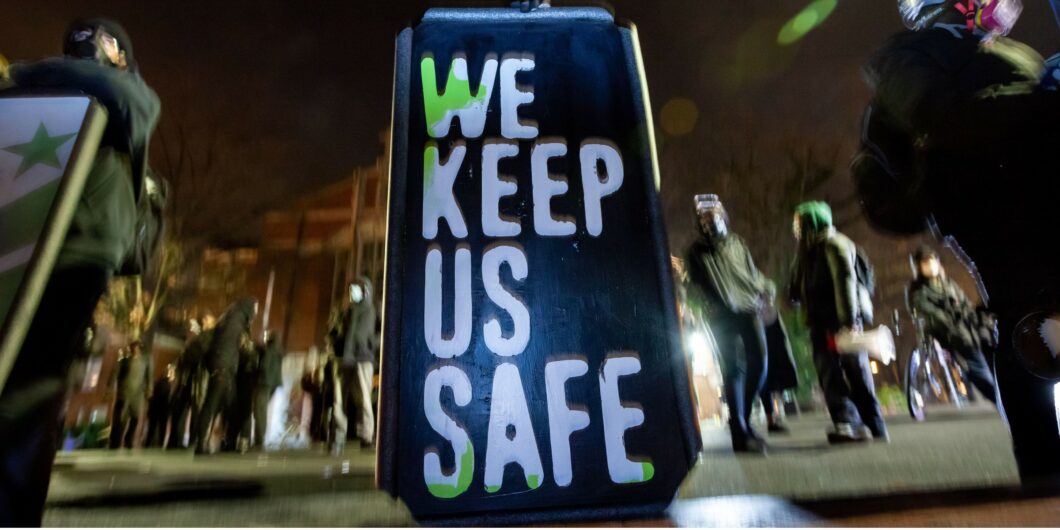The next great Christian university will oppose the combination of modernism and cultural ideology now regnant in the academy.
We Keep Us Grammatical
“We keep us safe” is a progressive mantra. At Princeton, for example, this statement, plus an exclamation point, heads the tweet with the “Princeton Gaza Solidarity Encampment Community Guidelines” that Princeton Israel Apartheid Divest (@PtonDivestNow) posted on April 26, the day after the local encampment was set up. And on May 15, in announcing that the encampment was “open for its last day,” the organizers wrote, “We keep us safe.”
The mantra is by no means confined to Princeton. It has been shouted, chanted, and written over and over again these past months at Columbia, at Yale, at UCLA, and all over the country.
At some level, it’s not a bad turn of phrase. It’s true that “safetyism”—a word coined by Pamela Paresky that Jonathan Haidt and Greg Lukianoff run with in their important 2018 book The Coddling of the American Mind—is a real problem these days, especially on college and university campuses, but no one should doubt that keeping people away from actual danger is a positive good. Furthermore, the staccato of monosyllables in “We keep us safe” has punch.
The catch, however, is that “We keep us safe” would appear to be ungrammatical. In English, a pronoun that refers to an antecedent noun or another pronoun in the same clause is typically reflexive, as in “I keep myself safe” and “They keep themselves safe” rather than “I keep me safe” and “They keep them safe.” Yes, the last sentence is perfectly fine, but only when “they” and “them” refer to different groups: “They [= the police] keep them [= the people in the community] safe.”
Although oddly absent from the text itself, the mantra makes what seems to be its first written appearance in the title of a book by progressive activist Zach Norris: We Keep Us Safe: Building Secure, Just, and Inclusive Communities, which was published in February 2020, just before the world descended into madness. (The paperback edition from twelve months later, endorsed on the cover by the disgraced Black Lives Matter [BLM] cofounder Patrisse Cullors, is called instead Defund Fear: Safety without Policing, Prisons, and Punishment.) The Google Books Ngram Viewer, which contains data through 2019, shows no evidence for “we keep us safe” (unsurprisingly, there are some instances of “we keep ourselves safe,” which showed a small peak in 2017). Now it’s a successful rallying cry.
The pronoun “we” is always charged in America. Who is and isn’t included? What does “We the People” mean in the Preamble to the Constitution? A 2020 “divertimento” by Darrell A. H. Miller titled “Constitutional Pronouns” offers a good starting point for a proper investigation, and I admire a remark my American Enterprise Institute (AEI) colleague Yuval Levin made in a Constitution Day essay two years ago about the “aspirational” nature of the pronoun, a subject on which he has more to say in American Covenant: How the Constitution Unified Our Nation—and Could Again, out next week from Basic Books.
Countless people, with a wide variety of perspectives, have discussed the American “we,” including in connection with safety. One example: in his book, the conclusion of which is titled “We the People,” Norris writes, “Rather than hold on to a fixed notion of who We the People are, we have to embrace what john powell [sic] calls ‘a bigger We.’” And another: the political theorist Peter Levine’s 2022 monograph What Should We Do?: A Theory of Civic Life examines at some length the force of each of the four words of his main title, which he calls “the citizen’s question.” Levine offered a summary of his views at a recent AEI conference on civic education, a gathering at which another speaker, Brook Manville (basing his remarks on his and Josiah Ober’s 2023 work The Civic Bargain: How Democracy Survives) stated that the bargain that we the people make in a democracy is “to prioritize the security for all of us.”
So what’s going on with “We keep us safe”?
We (by which I mean I and whoever is reading this) might, for the sake of argument, consider who is included in “we” from a strictly grammatical point of view. As it happens, linguists, speaking of what we (by which I mean I and some others but not necessarily you) call clusivity, like to say that the pronoun has two senses: there is “inclusive ‘we,’” which means “you and I (and maybe one or more others),” and there is “exclusive ‘we,’” which means “I and one or more others, but not you.” Many languages have entirely separate forms for the two categories: for instance, Tagalog (the standardized form of which, Filipino, is the national language of the Philippines), in which the inclusive pronoun is tayo and the exclusive kamí.
It strikes me as a modestly interesting linguistic question whether “We keep us safe” is a plausible English sentence if “we” and “us” have different meanings: “You and I keep them and me safe” or “They and I keep you and me safe,” say—or, for that matter, “We [in the encampment] keep us [in the encampment plus our ‘allies’] safe,” with overlapping but not identical inclusive referents. But this is an academic question and smells of the lamp, not the camp. There is no real possibility that this is what anyone who uses the phrase has in mind. The first-person plural pronominal forms in the Princeton announcement of May 15—there are twenty-one instances of “we,” twenty-one of “our,” and nine of “us”—clearly refer to the people in the encampment; the sole second-person pronoun appears in the final sentence of the document, “See you at Reunions,” which sure sounds like a warning to those who are not part of the “we.” (And, indeed, there were at least three separate pro-Palestinian protests on May 25, though none of these efforts to disrupt alumni festivities amounted to much.)
“We keep us safe” is yet another strike in the progressive war on language—a war led by militants.
A second idea for the sake of argument: it has long been known that there are limited circumstances under which a reflexive pronoun does not show up where it might be expected. For example, to take a pair of sentences made famous decades ago by one of my old teachers, Susumu Kuno, both “John hid the book behind him” and “John hid the book behind himself” are grammatical, though they have slightly different meanings. As Kuno points out, the use of the non-reflexive pronoun here suggests that John is in physical contact with the book that he hid; the use of “him” rather than “himself”—or, for that matter, of “us” rather than “ourselves” in “We hid the book behind us/ourselves”—is thus somehow less personal. “We keep us safe” is a very different sort of sentence, to be sure, but it is generally true that reflexives are more “empathic.” It is not plausible that those who use the progressive mantra wish for there to be linguistic distance between the “we” and the “us.”
Of course, as many readers will know, the historical reason for the grammatical anomaly is contextual: “We keep us safe” is the answer to the question “Who keeps us safe?”; the two are sometimes coupled in chant, including in call-and-response format. Until recently, this rhetoric, which two writers in The Nation spoke of as “ubiquitous” already in 2021, was associated especially with BLM and the raging summer of 2020. But since October 7, it has risen again in connection with the Palestinian cause, especially this spring, once university presidents—most recently and forcefully Santa J. Ono of the University of Michigan—began stating that encampments were unsafe, both for the participants and for everyone else.
Now, as long as the initial “we” of the answer is stressed, the pair of sentences “Who keeps us safe? We keep us safe!” is grammatical and presents a striking example of how pragmatic considerations can override syntax. While “Who keeps us safe? We keep ourselves safe!” is undoubtedly grammatical as well (indeed, conventionally more so), it sounds ridiculous, at least in call and response, where rhythm is paramount. Incidentally (and in small correction of what I suggested before), “I keep me safe” is also fine in a context of this kind, as in an exchange that the educational psychologist Travis Wright once reported having with a troubled five-year-old:
“Some people do hurt children. I want to help you feel safe,” I replied.
Putting his hands on his hips, James looked at me and said, “I keep me safe.”
Does this mean, then, that most uses of “We keep us safe” on campuses today should be viewed and heard as felicitous?
No.
With nothing preceding it, “We keep us safe” is just strange—and to me, at least, keeping the implied question in mind does not make it less so. In 2020, the strangeness may have grabbed some readers who saw the dust jacket of Norris’s original book. But why would anyone in 2024 buy a pink vinyl sticker with the words “We keep us safe”?
To return to Princeton. On April 29, when a number of people, most of them students, were arrested after briefly occupying an administrative building on campus, the crowd of onlookers chanted these same four words. Three reporters described the scene for the main student newspaper, the Daily Princetonian: Professor Max Weiss
asked for the road to be cleared in order for the students on the bus to be released with summonses, to which people began chanting “we keep us safe” and calling for disciplinary charges to be dropped.
But in fact, as the video linked in the article shows, the crowd was actually chanting “Who keeps us safe? We keep us safe!” I have no sympathy for the occupiers and their claque, but there is undoubtedly rhetorical power in the full eight words.
By contrast, the two examples from my initial paragraph—and many more—lack verbal context. The tweet from April 26 about encampment guidelines dives right in with “We keep us safe! None of us are free until all of us are free—FREE PALESTINE!”; this is unlikely to win over the skeptical. And as for the May 15 announcement about the closing of the encampment on campus, the writers decided to make “We keep us safe” the first sentence of a paragraph, with the last sentence of the preceding paragraph not something like “Who keeps us safe?” but rather “We honor every martyr, today and every day.” True, the two sentences before these also begin with the pronoun “we,” as does the one following, but despite the superficial parallelism, there is no call and response here: these other sentences have no rhetorical snap, containing respectively eleven, twenty-nine, and twelve words apiece.
One question I don’t know how to answer is whether those who spout “We keep us safe” without the preceding question are doing so to be deliberately provocative or whether they really have no sense of style. At one level, the answer does not much matter, and there are obviously more important things to worry about in all this than grammar—even if “[g]rammar is politics by other means” (to quote ecofeminist Donna J. Haraway in a discussion about, in part, the pronoun “our”) and even if a recent study in the Journal of Neurolinguistics shows that hearing grammatical errors results in increased stress.
Still, “We keep us safe” is yet another strike in the progressive war on language—a war led by militants who consider traditional linguistic niceties to be racist and/or classist and who want everyone to bow down to the new pronominal gods. The fact is that someone who says or writes “We keep us safe,” whether in direct response to “Who keeps us safe?” or not, is using a shibboleth, outing himself (more often these days, herself) as a progressive who may be an anti-Semite and, wittingly or unwittingly, an apologist for Hamas. From the words and actions of such a person, the rest of us may well need to protect ourselves.



